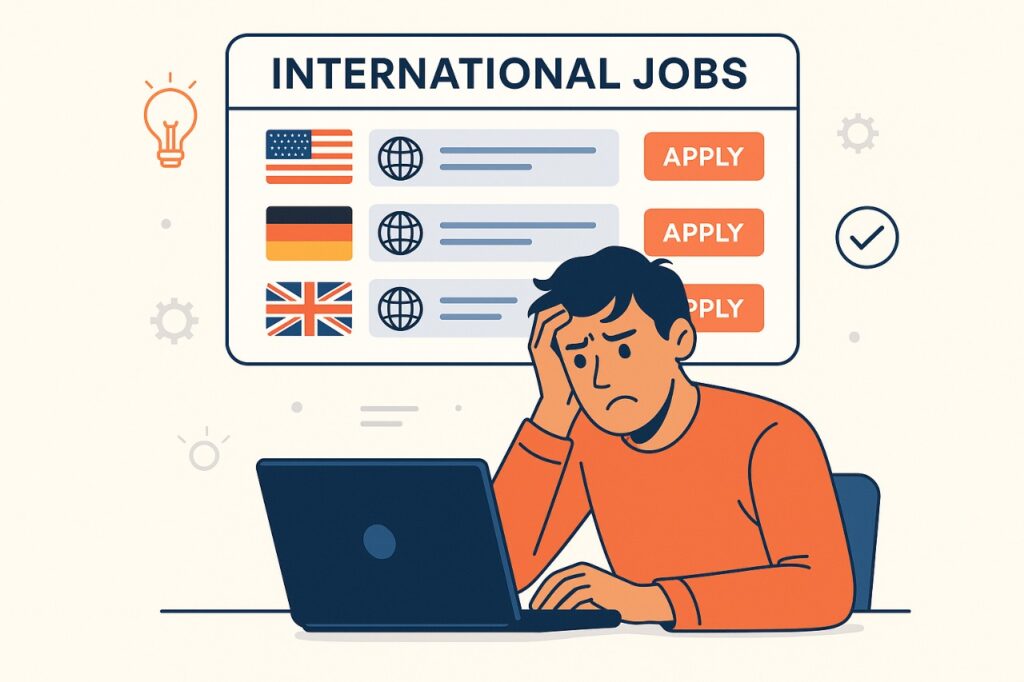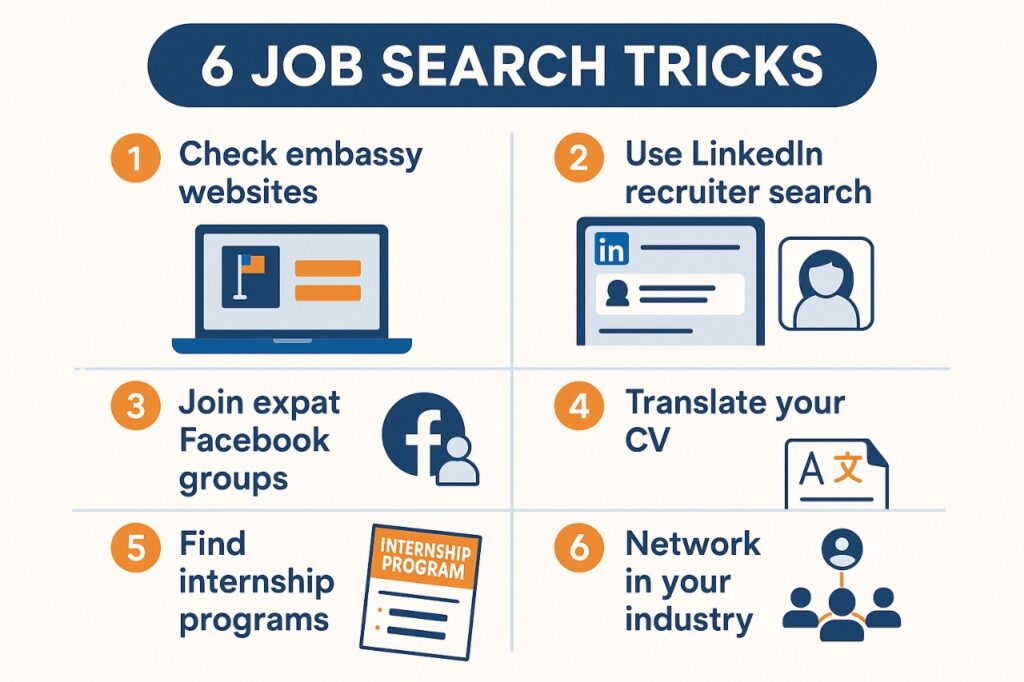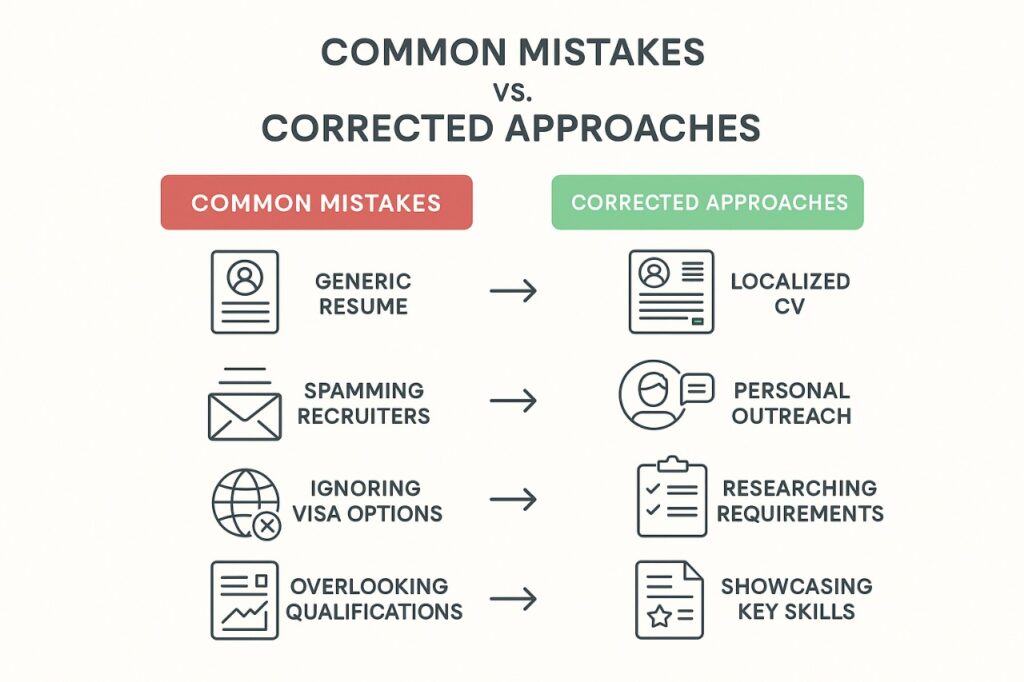Table of Contents
Introduction
Finding a job abroad can feel like trying to unlock a secret world. The rules are different, the platforms unfamiliar, and competition often fierce. Whether you’re looking for a career upgrade, adventure, or better pay, knowing How to Find Job Abroad effectively is crucial.
This article reveals 6 surprising How to Find Job Abroad, actionable tricks that most job seekers overlook—strategies used by expats, remote professionals, and international recruiters to tap into global job markets. From hidden job boards to referral hacks, these tips work even if you don’t have direct experience abroad.
If you’re tired of applying with no replies, or confused about where to even start—this is for you.
🔍 Here’s a sneak peek at what you’ll learn:
- The hidden power of “job shadowing” offers
- A LinkedIn trick that bypasses global gatekeepers
- How to use embassy websites to find legitimate openings
Let’s get started.

Quick Overview: What You’ll Learn
Here’s what these 6 surprising tricks How to Find Job Abroad we will teach you:
- Uncover hidden overseas jobs using local channels
- Use expat communities and embassies to your advantage
- Optimize LinkedIn to attract international recruiters
- Tap into referral loops and alumni networks
- Craft country-specific resumes and CVs
- Leverage short-term programs as career springboards
⏱ Time Investment: 1–2 hours/week
🧠 Skill Level: Beginner to Intermediate
🛠 Tools Needed: LinkedIn, Google, embassy/job board access, resume builder
Core Tips Section
Tip 1: Use Embassy & Consulate Job Boards
Many embassies and consulates post local job openings for their nationals. These often include NGO, language assistant, and administrative roles with visa support.
Why it works: Embassies ensure jobs are vetted and legal. These listings are underutilized by mainstream applicants.
Example: The German embassy in Pakistan regularly posts positions for interns, translators, and local staff.
Pro Tip: Bookmark the embassy’s official career page and check monthly.
Mistake to Avoid: Don’t rely solely on embassies—combine this with global job platforms.
Tip 2: Join Expat Facebook Groups & Subreddits
Join country-specific expat groups (e.g., “Expats in Dubai” or r/IWantOut). Members often share unlisted job openings, referrals, and hiring tips.
Why it works: These are real-time sources from people already working abroad.
Example: A member might share a vacancy at their workplace before it hits public boards.
Pro Tip: Ask for informational interviews—this builds rapport and opens doors.
Tip 3: Reverse Search LinkedIn Recruiters by Country
Instead of applying to jobs, find international recruiters by filtering LinkedIn by country + industry.
Why it works: Direct connections beat cold applications. You show initiative.
Example: Search “HR Manager” in “Amsterdam” > Message: “Open to relocation for [role] with [skill set]. Would love to connect.”
Pro Variation: Include a short video introduction in your message.
Common Mistake: Spamming without personalizing your pitch.
Tip 4: Apply to Volunteer or Internship Abroad First
Many full-time jobs abroad require experience in the country. Start with a short-term volunteer/internship opportunity.
Why it works: It builds local experience, networks, and credibility.
Example: Platforms like AIESEC, GoAbroad, or Erasmus+ offer programs with transition potential.
Pro Tip: Target internships with companies open to full-time extensions.
Tip 5: Customize CV to Local Standards
Each country has unique resume expectations—format, photo, language, even personal details.
Why it works: Recruiters filter out non-localized resumes instantly.
Example: A CV for Germany often includes photo, date of birth, and a detailed education section.
Pro Tip: Use platforms like Europass or Novoresume for country-specific templates.
Tip 6: Use Hidden Language-Specific Job Boards
Look for job boards in the local language even if you apply in English.
Why it works: These sites are used by locals and often have less competition.
Example: Jobs.ch for Switzerland, Seek.co.nz for New Zealand, and StepStone.de for Germany.
Mistake to Avoid: Applying without translation. Use DeepL or ChatGPT to translate your resume or message.

Bonus Tips & Advanced Strategies
Bonus Tip 1: Use Google’s “site:” search for hidden jobs (e.g., site:.nl marketing jobs)
Bonus Tip 2: Ask your university’s international office for alumni in target countries
Bonus Tip 3: Subscribe to country-specific job newsletters (e.g., WorkInStartups UK)
Bonus Tip 4: Join international freelance marketplaces to get country-based gigs
Bonus Tip 5: Use “job alert” Google Alerts in the local language
Common Mistakes to Avoid
- One-Size-Fits-All Resume: Always localize it.
- Ignoring Local Networks: Local communities are key—don’t skip them.
- Relying on Global Job Boards Only: Sites like Indeed or Glassdoor miss many country-specific jobs.
- No Research on Work Visa Requirements: Know this before applying—don’t waste time.
- Sending Generic Messages to Recruiters: Personalize your outreach with relevance.
How to Find Job Abroad Fix: Create a research spreadsheet for each country you target to stay organized.

Tools & Resources for Implementation
- LinkedIn + LinkedIn Recruiter Search (Free)
- ChatGPT / DeepL for translation (Free)
- Novoresume & Europass CV Builder (Free/Paid)
- GoAbroad, Erasmus+, AIESEC (Free volunteer/intern opportunities)
- Expat groups on Facebook, Reddit, Discord
Pro Resource: RemoteOK and Jobspresso list remote-friendly international jobs with visa sponsorship info.
Measuring Your Success
- Track application response rates weekly
- Use a CRM tool (like Notion or Trello) to log jobs, recruiters, and follow-ups
- Measure interview-to-application ratio
- Expect early results within 4–6 weeks if you apply these tips consistently
- Adjust country or job focus based on success metrics
Conclusion & Action Plan
You now have 6 surprising tricks How to Find Job Abroad that can completely shift how you approach your overseas job hunt. From leveraging embassies to mastering recruiter outreach, these tips bypass the standard noise and help you stand out globally.
Your 30-Day Plan:
- Week 1: Research embassies + join expat groups
- Week 2: Reach out to 10 recruiters on LinkedIn
- Week 3: Customize your CV + start applying
- Week 4: Explore internships or short-term options
Take action today—and get closer to your goal of working abroad! How to Find Job Abroad!
How can I find legit job offers abroad?
Use embassy job boards, verified internships like AIESEC, and trusted platforms like Jobspresso to avoid scams
What’s the best way to contact recruiters overseas?
Send personalized LinkedIn messages highlighting your interest, skills, and willingness to relocate.
Why should I localize my resume?
Each country has unique expectations. A local-style CV improves your chances of getting shortlisted by recruiters.
Can I find a job abroad without experience?
Yes. Start with internships, volunteering, or entry-level roles that provide a pathway to permanent positions.
How long does it take to get a job abroad?
If done strategically, many job seekers get interviews within 4–8 weeks of focused searching using these tips.
Internal Links:
- Combine these with our International Resume Tips
- Discover more advice in our Career Growth Collection
- Learn how to Optimize Your LinkedIn Profile for Global Reach
- Explore Freelancing for International Clients Guide
External Links:
Break the borders of your career—6 tricks How to Find Job Abroad and to land a job abroad now! 🌍✈️





